After checking out Vorke V1 mini PC hardware in the first part of the review, it’s now time to publish the review starting with system information, benchmarks, and user testing. The device competes with similarly priced devices based on Intel Atom x7 processor such as Voyo V3 and Beelink BT7, so I’ll also include some comparisons to those in the review.
Setup and System Information
I connected USB keyboard and mouse, an Ethernet cable, HDMI and VGA cables to check dual display support, as well as the power supply. I did not connect my USB 3.0 hard drive since, I’ve already fitted the mini PC with an internal 1TB hard drive.
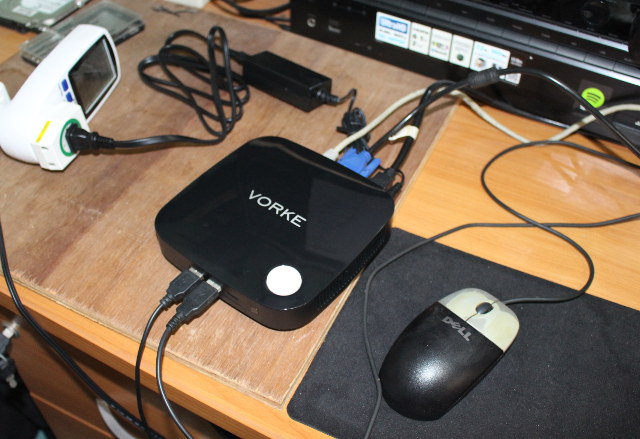
Pressing on the large power button on the top of the device will boot it, and after a few seconds, you’ll get to go through Windows 10 setup by first accepting the EULA.
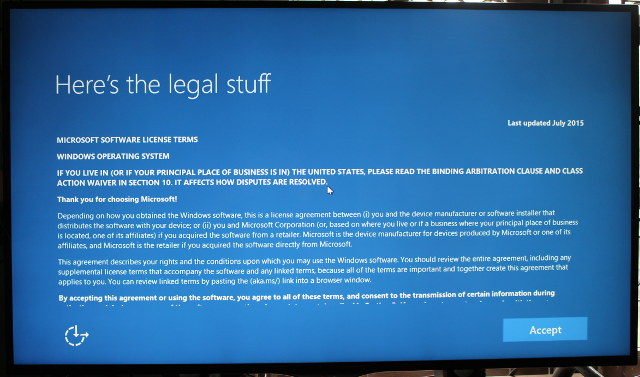
The next steps are Custom or Express settings selection, and user account creation. I have not been asked to select the language, nor configure the network, as with some other Windows 10 mini PCs. That’s something you can do later, and with Ethernet, you should have Internet connectivity without doing anything provided your router is using DHCP.
Apart from that there’s nothing else to configure really. In my case, my hard drive was formatted to EXT-4, so I had to reformat it with NTFS in order to access it in Windows. The C: drive (included FORESEE SSD) had 47.2GB free out of 59.1GB in total, the 1TB hard drive (my own) had 931 GB capacity after I formatted it.
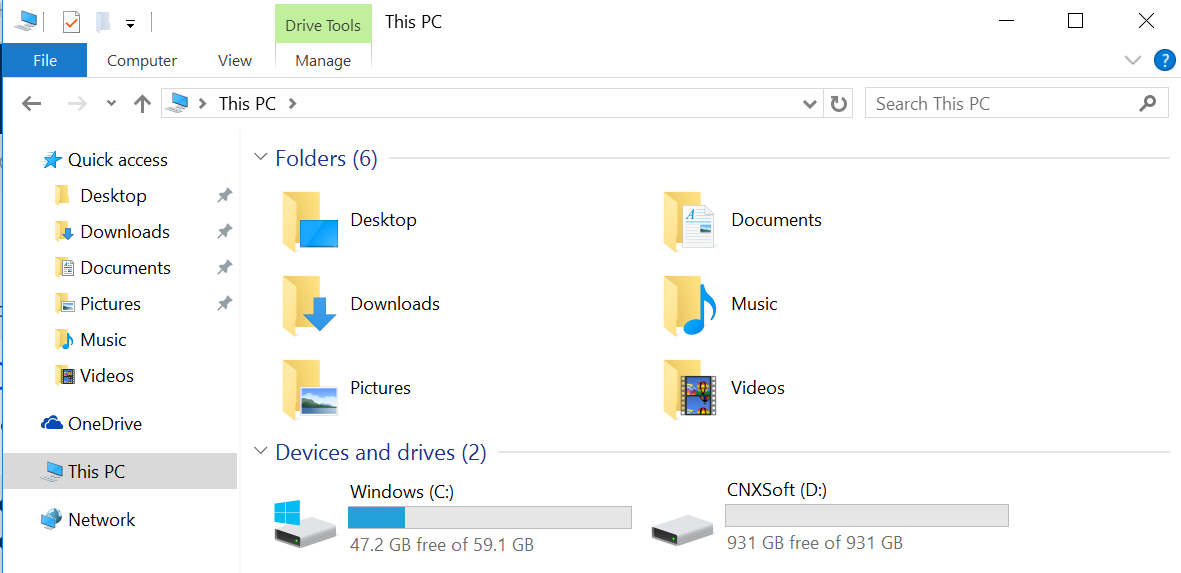
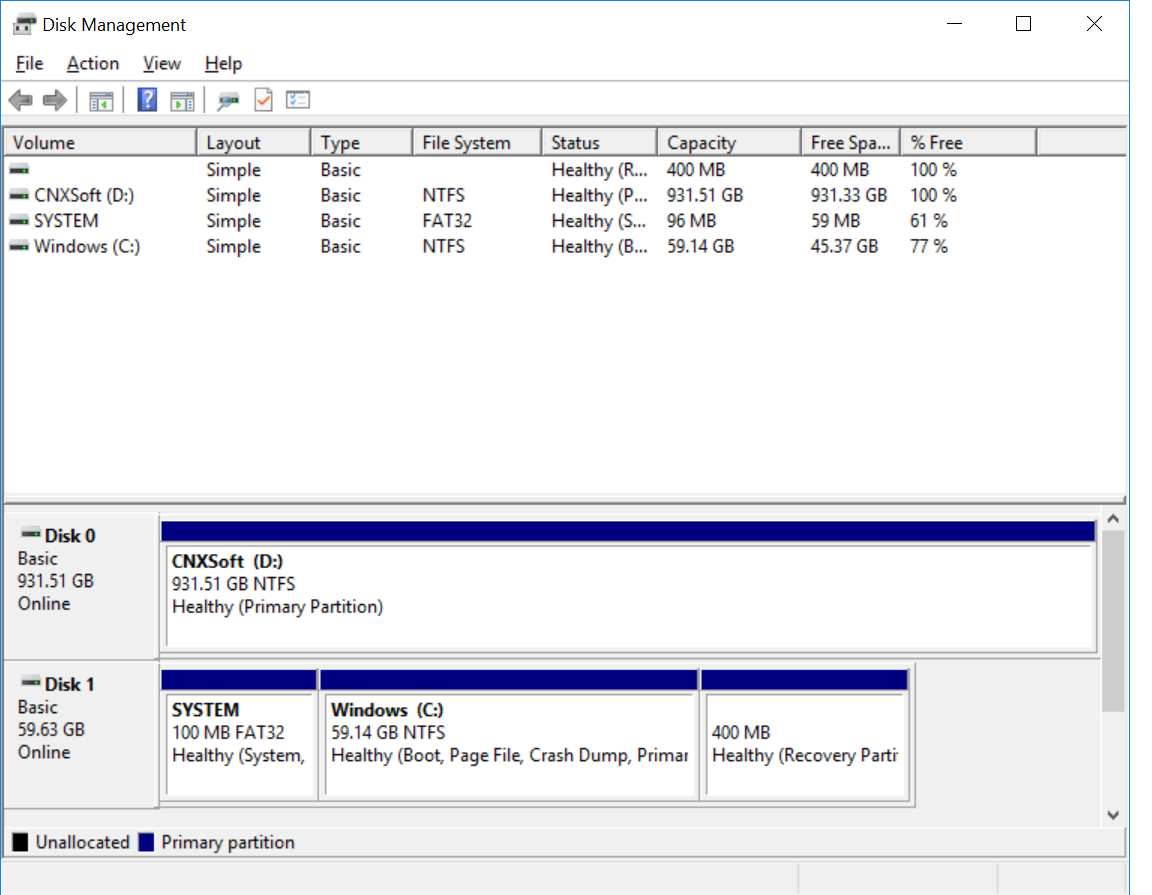
Then I went to the Control Panel to check the Windows 10 license was indeed activated, and some basic hardware information.
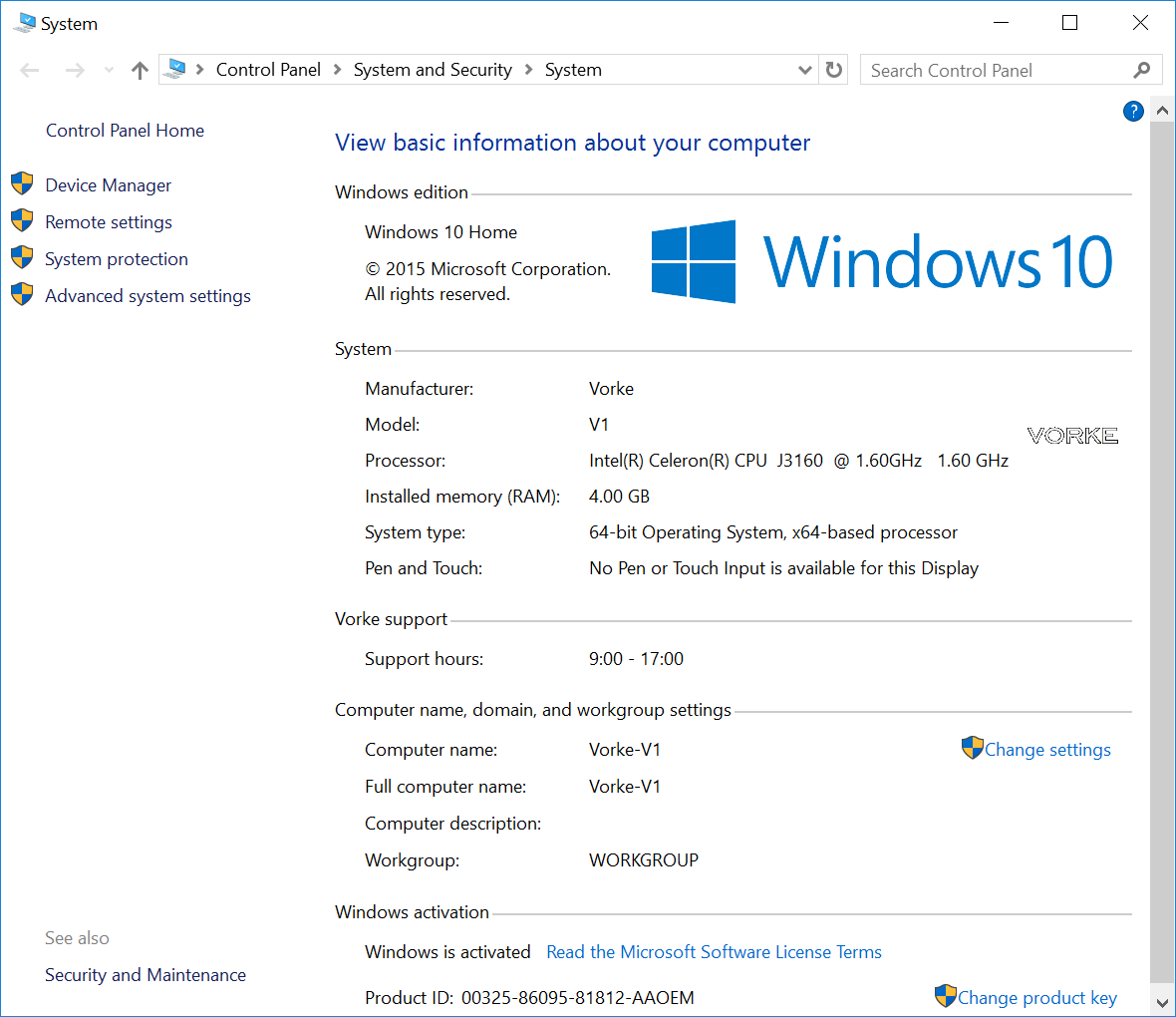
Vorke V1 comes with an Intel Celeron J3160 quad core processor @ 1.60 GHz, 4GB RAM, and runs a legit Windows 10 Home 64-bit as advertised. The Device Manager list some of the peripherals and chips used by the system.
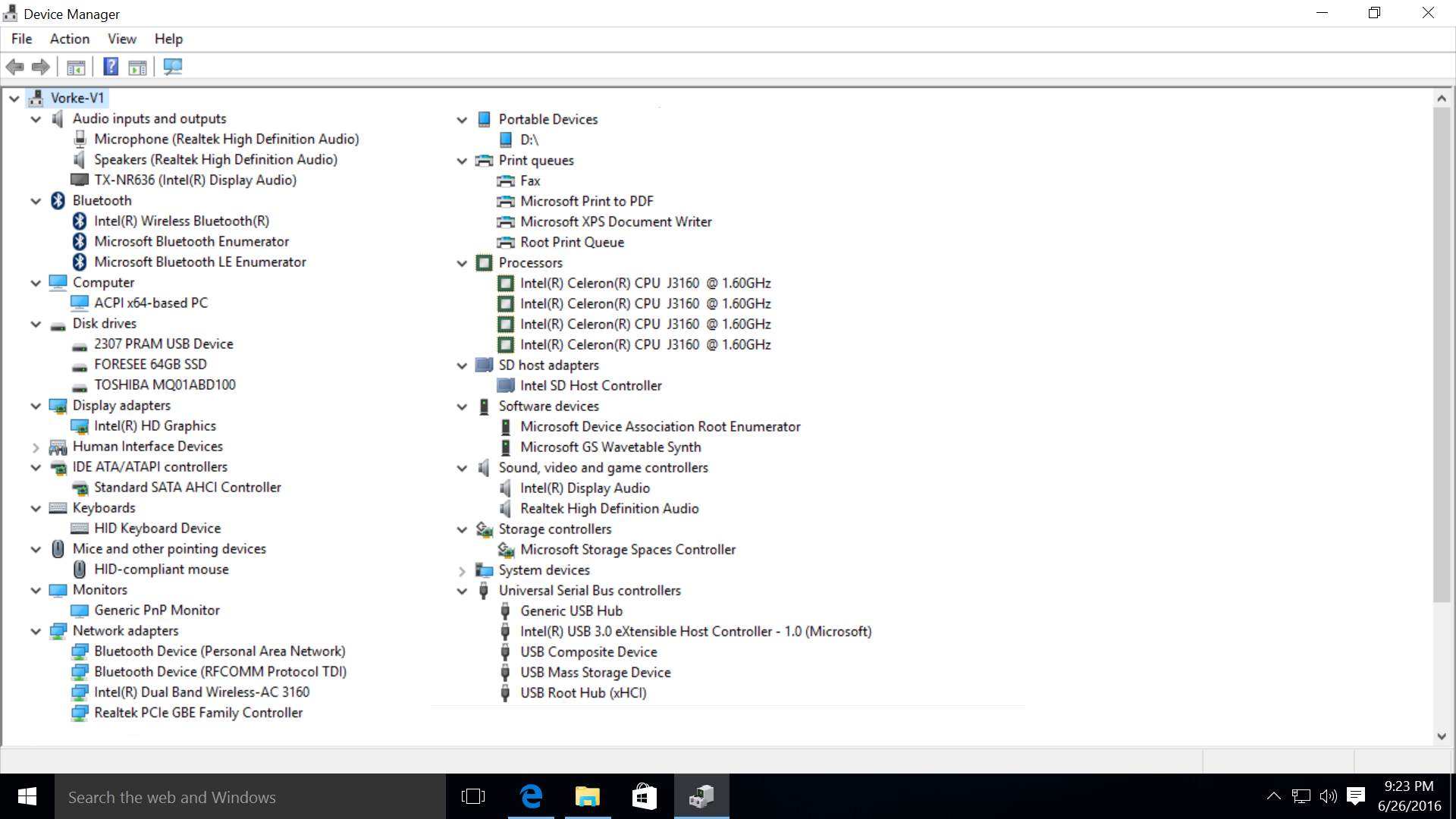
HWiNFO64 provides more details about the Intel Celeron J3160 SoC, memory (single channel only), and some information about the motherboard (THD RX2) and UEFI version.
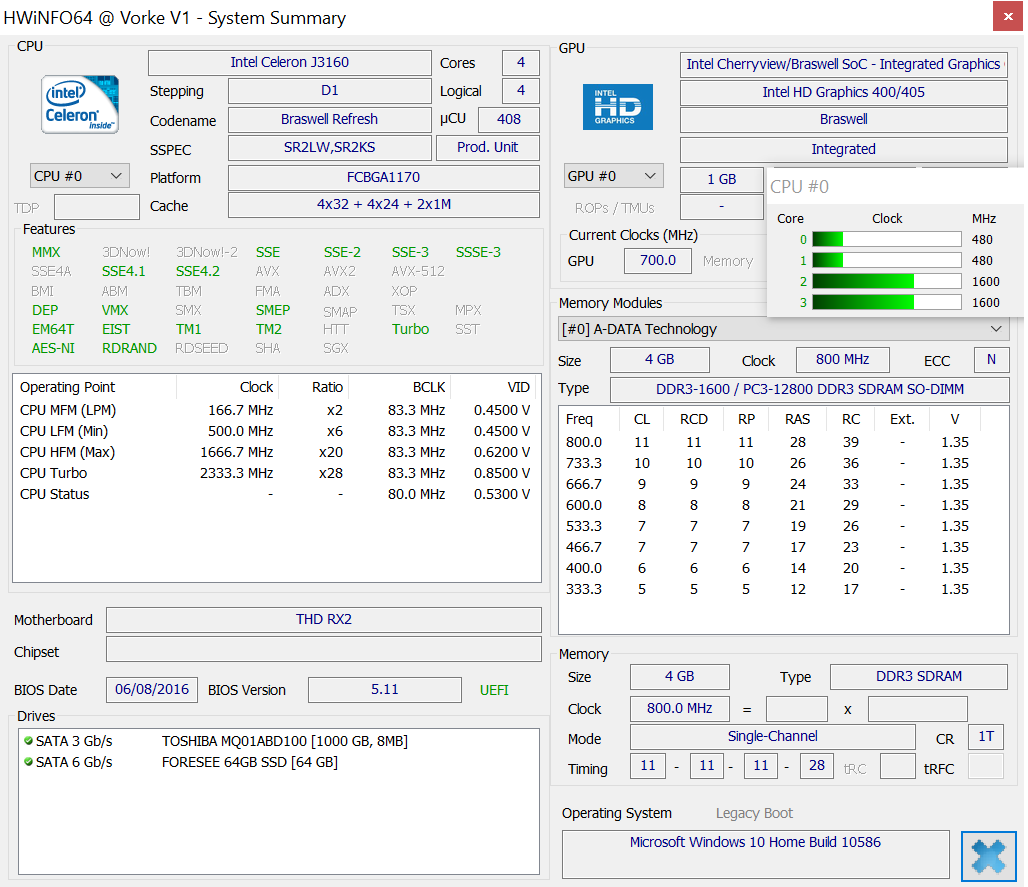
Celeron J3160 has exactly the same “CPU Features” as Intel Atom x7-Z8700.
One thing I liked about Beelink BT7 is that it shipped with a CD ROM driver, but Vorke V1 does not, and I could not find them online. I’ve asked, and wait for an answer.
Finally, I tried dual display support, and the VGA cable was connected to a Full HD Sharp TV, and I could setup extended display very easily.
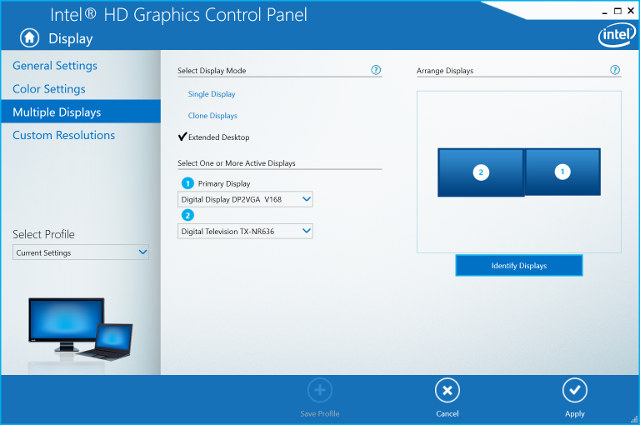
However the maximum resolution I could set was 1680×1050, and the text was rather blurry, even more so than usual on VGA monitors.
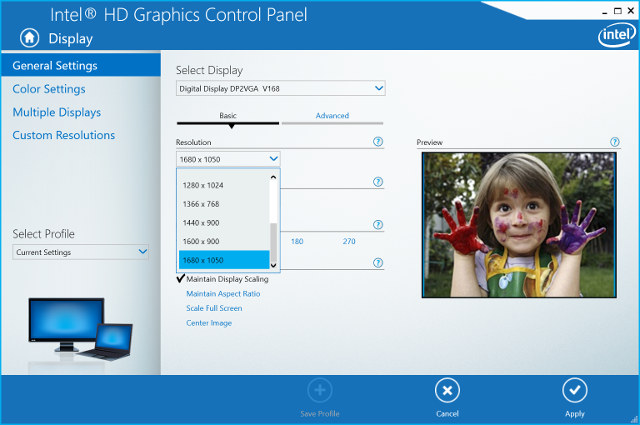
Vorke V1 Benchmarks
The first benchmark I ran was PCMARK 8 Conventional and Accelerated (with OpenCL).


The scores are only slightly better than the ones I got on Beelink BT7 with 1,545 and 1,315 against 1,509 and 1,211 points on the Cherry Trail mini PC. So I would not expect the end user to notice much difference here.
You can consult the results for Conventional and Accelerated benchmarks for the complete details.
Normally, I’d run 3DMark next, but after downloading and installing it several times, I was never able to run any of the tests, with all ending quickly with zero score and an undefined error. AndroidPC.es did run 3DMark’s Ice Storm and Cloud Gate on their own sample however, and respectively achieved 20,984 and 2,451 points. Again the results are quite close to Beelink BT7 scores: 23,999 and 2,185 points.
Passmark 8 results show around 9% improvement over BT7 with 921 points.
Next up is storage performance, which should not be neglected while buying a mini PC, as everything will feel snappier when storage is fast, and the random write and read performance is especially important for the drive used by the operating systems. As usual, I ran CrystalDiskMark on the C: drive (SSD with Windows 10), as well as on the D: drive with my own 1TB SATA drive connected inside the mini PC.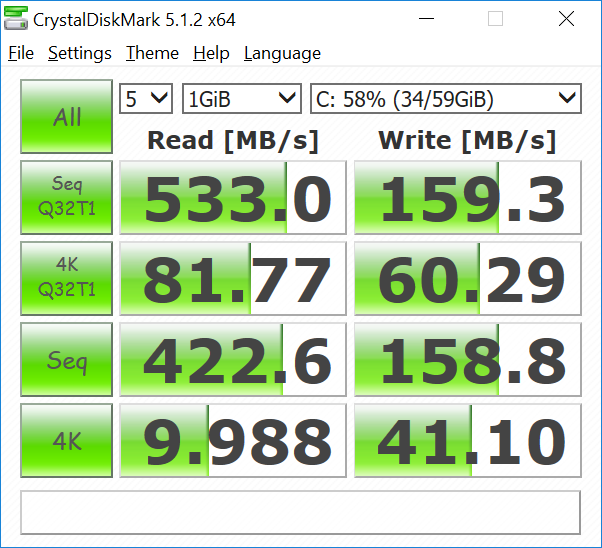 FORESEE is not exactly known for their ultra eMMC or NAND flash, but here the results are not too bad, and even a little better than the M.2 SSD used in Beelink BT7.
FORESEE is not exactly known for their ultra eMMC or NAND flash, but here the results are not too bad, and even a little better than the M.2 SSD used in Beelink BT7.
The hard drive performance is more or less as expected for a mechanical drive, with slow random I/Os, and around 110 MB/s for read and write sequential speeds.
At first I was disappointed with Ethernet, as while Vorke V1 specifications clearly mention a Gigabit Ethernet port, it only connected at Fast Ethernet speeds to my Gigabit switch (FE: Orange LED; GbE: Green LED), but later it began working at Gigabit speeds, and a full duplex transfer test using “iperf.exe -t 60 -c server_ip -d” showed excellent performance:
|
1 2 3 4 5 6 |
Client connecting to 192.168.0.111, TCP port 5001 TCP window size: 144 KByte (default) ------------------------------------------------------------ [ 6] local 192.168.0.104 port 60816 connected with 192.168.0.111 port 5001 [ 6] 0.0-60.0 sec 5.97 GBytes 855 Mbits/sec [ 5] 0.0-60.0 sec 6.29 GBytes 900 Mbits/sec |
WiFi supports 2.4 and 5.0 GHz and I could connect to all my access points, including at 802.11ac speed.
I ran iperf in one direction (download), and the results were rather good @ 55.6 Mbps, much better than on either Voyo V3 or Beelink BT7 which averaged around 30 Mbps.
|
1 2 |
[ 4] local 192.168.0.104 port 5001 connected with 192.168.0.109 port 51723 [ 4] 0.0-60.1 sec 398 MBytes 55.6 Mbits/sec |
Finally, I draw a chart between various low power Intel platforms, and that shows the Cherry Trail and Braswell are in the same ball bark, and if you really want a boost in performance you have to go with the much more expensive Core M platforms.
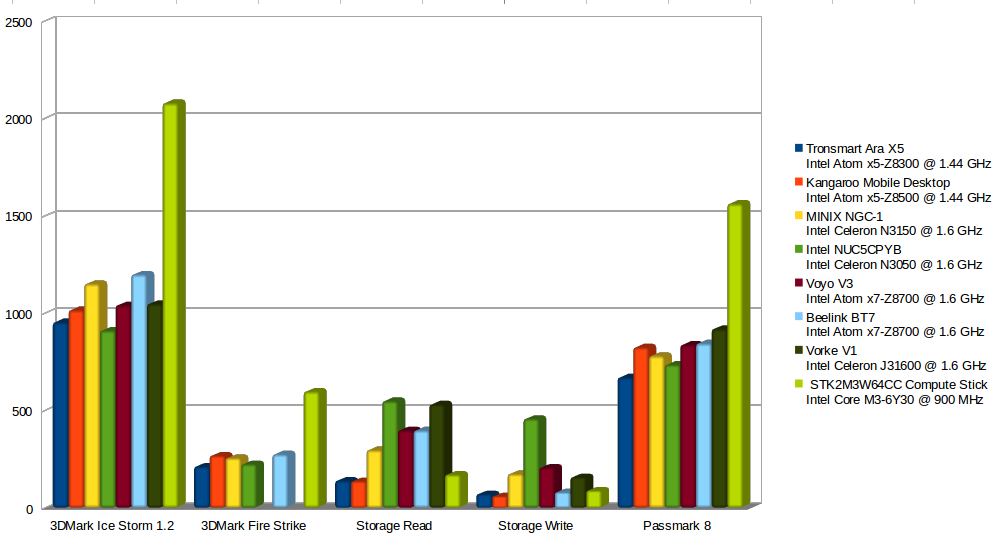
3DMark Ice Storm results are divided by 20 in order to generate a readable chart. The storage part of chart also shows the FORESEE SSD used in Vorke V1 is not bad at all compared to other competitors, even against the more expensive MINIX NGC-1.
Vorke V1 User Experience
The benchmarks showed the mini PC has decent performance, with the only hiccup being that I was no able to run 3DMark at all, but others did.
I used to select Microsoft Edge during review due to better YouTute performance, but since I’ve now found out that disabling VP9 on Chrome and Firefox fixes video stuttering in YouTube, I decided to replace Edge with Chrome in Vorke V1 video review.
So the tests will be as follows:
- Multi-tasking – Using Chrome, Thunderbird, LibreOffice, and Gimp at the same time
- Web Browsing with Chrome
- Loading multiple tab with CNX Software
- Playing a 1080p YouTube Videos
- Playing a flash game (Candy Crush Saga)
- Gaming with Asphalt 8
- Kodi 16.1 @ 4K resolution with 4K videos using H.265 or H.264 codecs, and HDMI audio pass-through
The performance and capabilities of Vorke V1 Braswell mini PC in those tests match exactly the ones in Cherry Trail Atom x7 mini PCs with 4GB RAM, with all tasks performing smoothly, and Asphalt 8 game that would benefit from higher frame rates. Kodi 16.1 can handle XVDA2 hardware decoding for 8-bit H.265 and H.264 videos up to 4K @ 30 fps, but 10-bit and VP9 videos fall back to software decoding, and the processor is not quite powerful enough to handle 4K that way. HDMI audio pass-through works for Dolby Digital and DTS, but 7.1 audio formats such as TrueHD and DTS HD are not supported. You can still get audio using Kodi’s audio transcoding feature, or accepting down-mixing to PCM 2.0 audio.
I usually only check for thermal throttling during benchmarks and the tests done above, but I’ve now decided to push the devices a bit more by running OCCT stress tool, although I may switch to other stress testing tools in the future. The tool runs heavy load on four cores, and I can check CPU temperature and frequency, as well as throttling status using HWiNFO64 utility.
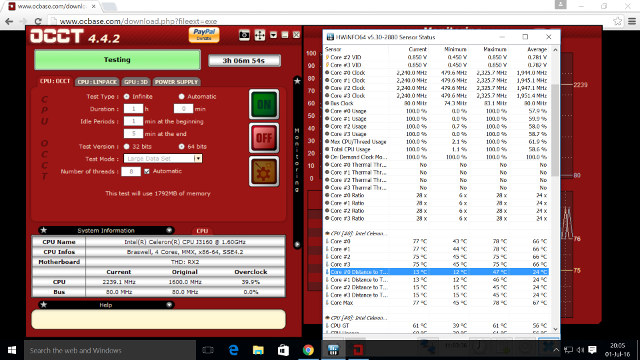
I ran that test for a little over 3 hours, and Vorke V1 had no problems at all with the maximum temperature reached being 78 C, well below the 90 C junction temperature. The frequency chart generated by the utility also shows the system was running at the turbo frequency (~2.24 GHz) for the whole time, except for a small dip.
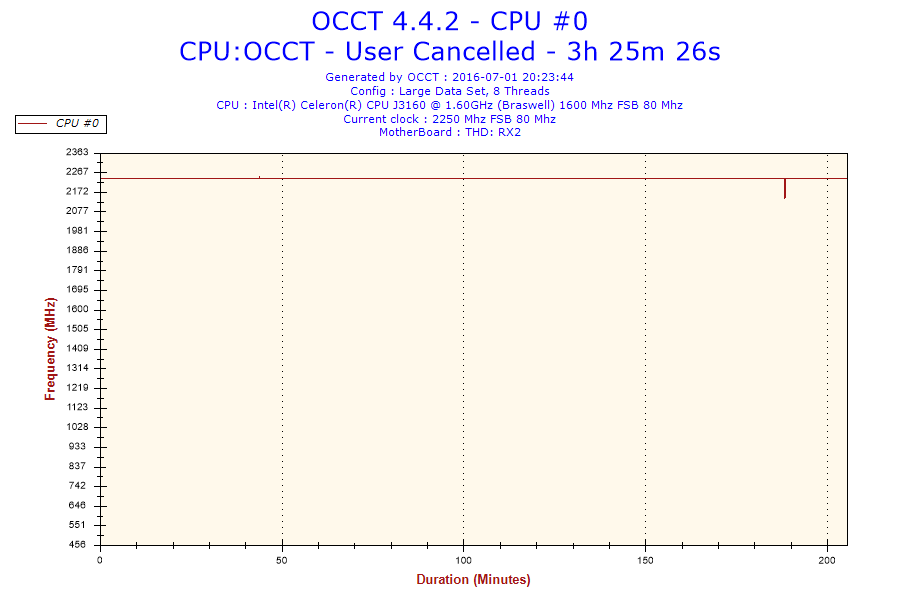
So you can expect a constant performance over time under any kind of loads.
Conclusion
I’m pleased with my experience with Vorke V1 mini PC, performance is good without throttling at any time, Windows 10 is activated, storage performance is very good, and both Gigabit Ethernet and 802.11ac WiFi deliver excellent networking performance. The only downsides I can think of are that it’s not fanless – the fan is always on but relatively quiet -, and the case design is much larger than the ones of competitors, and IMHO not quite as good looking. Another minor issue is that while 7mm 2.5″ SATA hard drives will fit without issues into the internal SATA, 9.5mm hard drives will slightly bend the bottom cover, and leave a tiny gap as explained in the unboxing and teardown post. But if you don’t care about the fan, and the design, and want something that works, I can highly recommend Vorke V1. I’m not a big fan of installing Ubuntu on devices where you have paid a Windows license, but Ubuntu 16.04 can be installed using the standard ISO, something you cannot do with Cherry Trail mini PCs without losing some features. I told GeekBuying they should provide a model without Windows, but they did not seem interested at all.
Vorke V1 price is also rather attractive, as while the standard price is $199.99 on GeekBuying, you can bring that down to $159.99 with VORKE40OFF coupon. The only other seller that showed in a Google search was Banggood ($199.00).

Jean-Luc started CNX Software in 2010 as a part-time endeavor, before quitting his job as a software engineering manager, and starting to write daily news, and reviews full time later in 2011.
Support CNX Software! Donate via cryptocurrencies, become a Patron on Patreon, or purchase goods on Amazon or Aliexpress


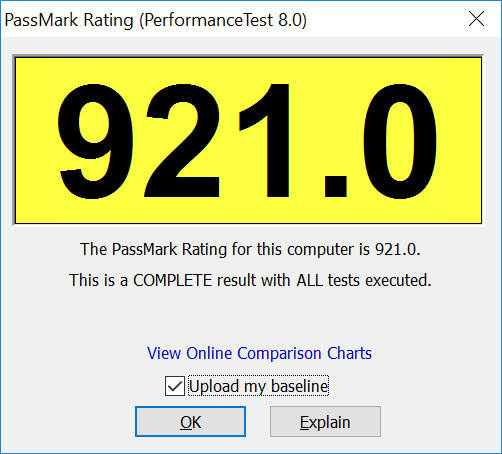
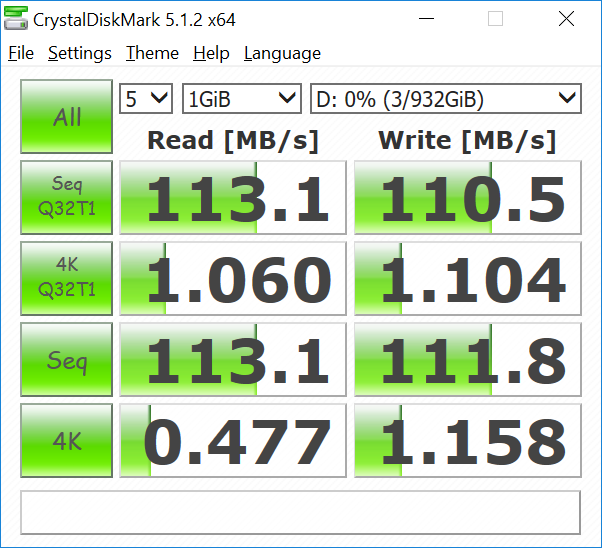




If they sell this device without Windows license, they surely have me as a customer, and i’d recommend to many friends.
bad news …. Celeron J3160 have same issues with HD audio windwos drive than N3XXX
4K TV already broken? 🙁
@rasz_pl
Yep 🙁 I bought it last January thanks to your help guys, but that line just appeared a few days ago, about 18 months after purchase, and the warranty was only for one year.
If it is just one line I may keep it like this. It’s not too bad. LG is asking money just for check. Another person told me on Google+ if that’s only one line, it could just be a connector issue, so I could try it look into it myself. Worse case the panel would need to be changed.
Any chance of publishing the energy consumption from the wall, under idle, browsing, film watching scenarios, as you have done for other mini-pc reviews ?
@paul
Sure. Figures with internal 2.5″ SATA HDD:
1. Off – 0.3 Watts
2. Sleep – 0.4 Watts
3. Idle with screen on – 7.0 to 7.4 Watts.
@cnxsoft
Thanks for that. Interesting that my 3 year old NUC D54250WYK with 15W TDP i5-4250U, 8GB DDR3L, mSATA 256GB, and Intel Wireless-AC 7260 connected to APN, Idle Consumption flicks bwetween 6.5 and 7.4Watts when browsing, slightly lower than the 6Watt TDP Braswell powered Vorke. Perhaps i5-4250U has more efficient low-power states than Braswell/CherryTrail ?
Main problem with the D54250WYK is not WiFi speed but very poor WiFi Range. All nearby APN’s are WiFi-N. Unless I can connect to them, speed irelevant. I don’t know if that is down to the AC 7260 card or poor design of the dual internal antennas. My N5 smartphone which obviously has small internal antenna has far better WiFi Range.
Your review states the Vorke Wifi is rather good at 55.6 Mbit/s beating BT7 & Voyo V3, but gives no data on Range performance. Unlike the vorke, the BT7 has an external Antenna which may allow connection at greater distances than the Vorke. For that reason I think SBC’s with an external antenna socket should have an advantage, but we need measurements to prove which is best.
It would help if your reviews can include a table of Speed v Range for 2.4 and 5GHz.
Your Breakdown article shows at least the huge ugly box has space to fit external antenna sockets, but uses the older HMC form-factor so wont work with newer N.2 cards like Wifi AC-8260 .
@paul
You don’t have mechanical drive, so that may explain it. The drive should add 2 to 3 watts to the power consumption.
My Wife had the same problem with her Intel NUC (similar model as yours), so we bought a 802.11ac USB dongle, and that “fixed” the issue.
Testing range is a bit more complicated… I’d need to move the mini PC (and TV) around, or setup multiple routers around the house.
I just got mine too. Maxed out the video and CPUs for 4 hours no throttling at all!
When you look at the side the reason is clear, there’s huge openings for airflow.
Yes, the box is big and ugly compared to the Beelink, but you have to take the case off of the Beelink to get it to run without throttling (even then it throttles some).
If the price stays on $159 (last week, the old coupon code didn’t work), then it will give the BeeLink a run for it’s $$$’s.
Arg.. After running “Reset PC” to get back to factory settings, Windows only boots to a black screen :(.
Now waiting for recovery image from GeekBuying.
@cnxsoft
Finally, no problem. I forgot that for the first boot, if both HDMI and VGA cables are connected, but I only turned on the HDMI TV, and not the VGA monitor, nothing will show on the HDMI TV. Removing the VGA cable fixed the issue.
@cnxsoft
I did manage to find their website, but no image or even mention of this model on their support page. If you don’t get an image in a day or two, maybe I could create a recovery image for you. I’ve got tons of extra stuff on mine by now, so I’d had to find a large USB drive for it, but I think I could upload it to google drive or something.
BTW: I was looking forward to this review for weeks, wasn’t disappointed!. Only thing I think was missing (you probably said this but didn’t show a photo) was how easy it is to upload the thing, as the memory, storage, even Wireless card are all removable/upgradeable.
Anyway, if you get desperate e-mail me for the image.
We posted at the same time. There was no big problem finally.
About the potential for upgrade, I mentions it in the first part of the review (unboxing/teardown) @ http://www.cnx-software.com/2016/06/18/vorke-v1-braswell-mini-pc-unboxing-and-teardown/
@cnxsoft
I can confirm that without HDD, idle power consumption drops to 5.2 watts.
@cnxsoft
Hi, can you confirm that Ubuntu, OpenElec, and Lakka have video acceleration and audio working?
New coupon for Geekbuying, it’s only valid for 3 days: VKV140.
@Mat
I have not run any of those yet. I’ll try Ubuntu manually once GeekBuying provides Vorke V1 with a free operating system (FreeDOS or Linux distributions), or as a barebone system.
I don’t see why hardware video decoding or audio would not work as Braswell are desktop processors, and contrary to Bay Trail or Cherry Trail. The only limitation should be audio pass-through (no HD audio) like in Windows.
Incidentally there’s two guys selling these on Ali-express now, $189 shipped. As more people start selling them Geekbuying’s coupon price often becomes the regular price. I guess we’ll have to wait and see, but I think $160 is about right once the market saturates–with all the removable components it’s not too difficult to price out, if you have an idea what the board and CPU go for (I don’t know the cost of the Celeron J3160, but I can guess based on other low-end Celerons).
Vorke V1 drivers: http://www.mediafire.com/download/95utne8ksamauos/rx2_drivers_win10_X64_3160.rar
@cnxsoft
Sorry, I dont understand your answer. What that has to do with putting Ubuntu/OpenElec on a stick and try it as a live OS? It would be really great if you can confirm that Wifi, Ethernet, Audio,Bluetooth and Video work fine. Thanks CNX!
@Mat
See my review, Vorke V1 works well with Ubuntu.
@cnxsoft Thank you.
Where can I see your review?
@Mat
That one: http://hardware.hdblog.it/2016/06/28/vorke-v1-recensione/
I’ve just been told that a Windows license for a system with 4GB + 64 GB would be US$61, while 4GB + 32 GB would only be $25. So it’s very likely that Vorke V1 does not have a valid Windows license.
The Beelink BT7 will IDLE on Ubuntu 16.04 LTS 4.4.14 at 2.9Watts, gigabit on, screen off, no add. drives attached.
It’s possible to know the real factory/Productor name? I can’t find official informations on internet. Also seraching for serials.
@Ivan Dorna
Try to do a lookup on the Ethernet MAC address.
New coupon code on GeekBuying: 40VorkeV1
Will it boot without keyboard mouse and monitor plugged or no? I’d love to run this headless.
Thanks for the review and coupon!
@Riccardo
Running Ubuntu, will it boot without keyboard mouse and monitor plugged in?
Thanks
If a 2.5″ SSD is installed, how hot does it get? I bought a PiPo X6S for my brother and when a SSD was installed, the SSD got too hot and became unreliable. Since the Vorke V1 is Braswell, does anyone know the average temp of the SSD when installed? My Vorke V1 is on its way.
How well does Netflix run on this? Does it start to stutter after running a full HD show for a long period of time?
how do you fresh install windows 8.1 dont like 10 to much but trying it thru usb didnt work get mbr/gpt errors bios setting?
@william piper
That model was launched with Windows 10, so it’s unlikely that you’ll easily find Windows 8.1 drivers for it.
i dont think drivers will be a issue but install thru usb without some bios change is a issue thank you for time and response
Vorke V1 Plus released with Intel Celeron J3455 Apollo Lake processor @ http://www.geekbuying.com/item/VORKE-V1-Plus-Intel-Apollo-Lake-J3455-4G-RAM-64G-SSD-MINI-PC-379383.html
Hi @Riccardo e @cnxsoft to date what should you buy vorke v1 or vorke v1 plus? the plus has no upgradeable ram as it is welded. tips? thank you
@linux86
Vorke V1 will be a little cheaper, Vorke V1 Plus will be a little faster.